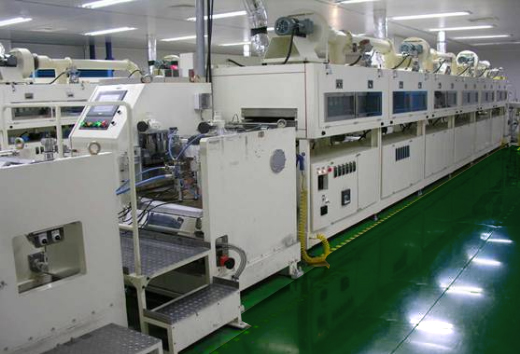Lithium Battery: Powering the Future of Electric Vehicles
Electric vehicles (EVs) are rapidly gaining popularity as a sustainable alternative to traditional gasoline-powered cars. One of the most critical components of an EV is its battery. Lithium-ion batteries have emerged as the frontrunner in this field, paving the way for the future of electric mobility. This article explores the significance of lithium batteries and their role in powering the future of electric vehicles.
Lithium batteries have revolutionized the way we think about energy storage. They are lighter, smaller, and more efficient than their predecessors, making them an ideal choice for electric vehicles. The key to their success lies in their chemistry. Lithium-ion batteries utilize lithium compounds as electrodes to store and release energy during the charging and discharging process.
The advantages of lithium batteries are numerous. Firstly, they have a higher energy density, meaning they can store more energy in a smaller and lighter package. This translates to longer driving ranges for electric vehicles, addressing one of the main concerns for potential EV buyers – range anxiety. With the continuous advancements in lithium battery technology, EVs are gradually closing the gap with traditional cars in terms of range.
Furthermore, lithium batteries offer faster charging times compared to other rechargeable batteries. This is crucial for EV adoption as it reduces the time spent waiting for a vehicle to recharge. As charging infrastructure continues to expand, quick charging capabilities become even more critical to the widespread acceptance of electric vehicles.
Another significant advantage of lithium batteries is their longer lifespan. They can endure more charge-discharge cycles compared to traditional lead-acid batteries, providing a more sustainable and cost-effective solution for EV owners. The longer lifespan of lithium batteries also contributes to reducing waste and environmental impact.
In addition to their suitability for EVs, lithium batteries have found applications in various other industries. They power our smartphones, laptops, and other portable electronic devices. Moreover, they are utilized in renewable energy systems, such as solar and wind power, to store excess energy for later use. This versatility further reinforces the importance of lithium batteries as a key component of our future energy landscape.
Despite all the advantages, there are still challenges that need to be overcome for lithium batteries to reach their full potential. One such challenge is the sourcing of raw materials. Lithium is a finite resource, and as the demand for lithium batteries increases, so does the need for sustainable mining practices and recycling programs to ensure the availability and ethical sourcing of lithium.
Another challenge is the safety concerns associated with lithium batteries. Although modern lithium-ion batteries have implemented safety measures to prevent overheating and combustion, incidents of battery fires still occur. Ongoing research and development are crucial to improving the safety standards of lithium batteries to gain the trust of consumers and eliminate any doubts about their reliability.

The industry is already addressing these challenges. Researchers are exploring alternative materials for battery electrodes to reduce the reliance on lithium. New technologies, such as solid-state batteries, are also being developed to improve safety and energy storage capabilities. Governments and organizations worldwide are investing in research and infrastructure to support the growth of lithium battery technology and its application in electric vehicles.
Lithium batteries are the backbone of the electric vehicle revolution. Their high energy density, fast charging capabilities, and long lifespan make them the ideal choice for powering the future of electric mobility. However, challenges such as sourcing and safety concerns must be addressed to ensure their sustainable and widespread adoption. With continuous advancements in lithium battery technology and the joint efforts of governments, organizations, and researchers, the future of electric vehicles powered by lithium batteries looks promising.
-
 LiFePO4 batteries, also known as lithium iron phosphate batteries, have gained popularity as an alternative to traditional lead-acid batteries. These batteries offer several benefits, including longer lifespan, faster charging, and better performance in extreme temperatures. In this article, we will explore these benefits in more detail. Longer Lifespan One of the biggest advantages of LiFePO4 batteries is their longer...Read more
LiFePO4 batteries, also known as lithium iron phosphate batteries, have gained popularity as an alternative to traditional lead-acid batteries. These batteries offer several benefits, including longer lifespan, faster charging, and better performance in extreme temperatures. In this article, we will explore these benefits in more detail. Longer Lifespan One of the biggest advantages of LiFePO4 batteries is their longer...Read more -
 Portable jump starter battery packs have become a popular accessory for car owners. They are a reliable on-the-go power solution that can jumpstart your vehicle in case of a dead battery. These battery packs come in various sizes and capacities, and they are designed to provide enough power to start your car or truck. One of the significant advantages...Read more
Portable jump starter battery packs have become a popular accessory for car owners. They are a reliable on-the-go power solution that can jumpstart your vehicle in case of a dead battery. These battery packs come in various sizes and capacities, and they are designed to provide enough power to start your car or truck. One of the significant advantages...Read more -
 The 12V LiFePO4 battery is a high-performance power solution that is designed to meet the power needs of various devices and appliances. It is known for its durability, efficiency, and reliability, making it a popular choice for many applications. One of the main advantages of the 12V LiFePO4 battery is its long lifespan. It can last up to 10...Read more
The 12V LiFePO4 battery is a high-performance power solution that is designed to meet the power needs of various devices and appliances. It is known for its durability, efficiency, and reliability, making it a popular choice for many applications. One of the main advantages of the 12V LiFePO4 battery is its long lifespan. It can last up to 10...Read more -
 In today's world, we rely heavily on electronic devices. Whether it be a smartphone, laptop or tablet, we often find ourselves in situations where the battery life of our devices is running low, and we are unable to find a power source to recharge them. This is where an emergency starter battery comes in handy. An emergency starter battery...Read more
In today's world, we rely heavily on electronic devices. Whether it be a smartphone, laptop or tablet, we often find ourselves in situations where the battery life of our devices is running low, and we are unable to find a power source to recharge them. This is where an emergency starter battery comes in handy. An emergency starter battery...Read more -
 In recent years, the concept of smart grids has gained significant attention in the field of energy management. A smart grid is an advanced electrical grid that utilizes digital technology to efficiently manage the generation, distribution, and consumption of electricity. One crucial component of smart grids is the use of lithium batteries, which offer several advantages over traditional lead-acid batteries....Read more
In recent years, the concept of smart grids has gained significant attention in the field of energy management. A smart grid is an advanced electrical grid that utilizes digital technology to efficiently manage the generation, distribution, and consumption of electricity. One crucial component of smart grids is the use of lithium batteries, which offer several advantages over traditional lead-acid batteries....Read more -
 Over the years, the industrial sector has witnessed significant advancements in technologies that have transformed the way businesses operate. From machinery to automation, every aspect of the industry has been touched by innovation. Among these groundbreaking technologies, one that has truly revolutionized the industry is industrial power products batteries. Industrial power products batteries, also known as industrial batteries, are...Read more
Over the years, the industrial sector has witnessed significant advancements in technologies that have transformed the way businesses operate. From machinery to automation, every aspect of the industry has been touched by innovation. Among these groundbreaking technologies, one that has truly revolutionized the industry is industrial power products batteries. Industrial power products batteries, also known as industrial batteries, are...Read more -
 Introduction: In recent years, the demand for sustainable and eco-friendly power solutions has been on the rise. As a result, researchers and manufacturers have been developing energy storage systems that are not only efficient but also environmentally friendly. One such innovation is the high-capacity 12V 100Ah LiFePO4 (Lithium Iron Phosphate) battery. This article explores the features and benefits of this...Read more
Introduction: In recent years, the demand for sustainable and eco-friendly power solutions has been on the rise. As a result, researchers and manufacturers have been developing energy storage systems that are not only efficient but also environmentally friendly. One such innovation is the high-capacity 12V 100Ah LiFePO4 (Lithium Iron Phosphate) battery. This article explores the features and benefits of this...Read more

